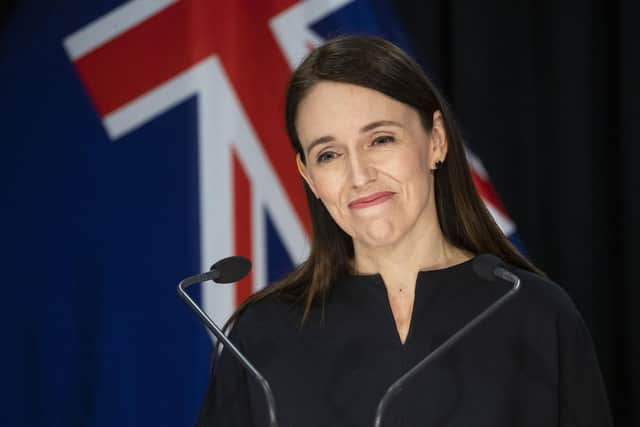Queen's death: New Zealand will not pursue becoming a republic after Queen's death, says Jacinda Ardern
Ms Ardern said she thought New Zealand would eventually become a republic, and it would probably happen within her lifetime, but that there were more pressing issues for her government.
The remarks were her first about the New Zealand republic debate since the Queen’s death, and reflect previous comments she has made on the issue.


Advertisement
Hide AdAdvertisement
Hide AdMs Ardern has also previously expressed her support for the country eventually becoming a republic.
Under the existing system, the British monarch is New Zealand’s head of state, represented in New Zealand by a governor-general. The governor-general’s role these days is considered primarily ceremonial.
Still, many people argue New Zealand will not fully step out from the shadows of its colonialist past and become a truly independent nation until it becomes a republic.
“There’s been a debate, probably for a number of years,” Ms Ardern said.
“It’s just the pace, and how widely that debate is occurring. I’ve made my view plain many times. I do believe that is where New Zealand will head, in time. I believe it is likely to occur in my lifetime.
“But I don’t see it as a short-term measure or anything that is on the agenda any time soon,” Ms Ardern said.
She said becoming a republic was not something her government planned to discuss at any point.
“As I say, in large part actually because I’ve never sensed the urgency,” Ms Ardern said.
Advertisement
Hide AdAdvertisement
Hide Ad“There are so many challenges we face. This is a large, significant debate. I don’t think it’s one that would or should occur quickly.”
The death of the Queen and ascension of King Charles III to the throne has revived the republic debate in many countries around the world.
Charles became the head of state not only in the United Kingdom and New Zealand, but also in 13 other countries, including Canada, Jamaica and Australia.
Australian Prime Minister Anthony Albanese started laying the groundwork for an Australian republic after he was elected in May.
But he said on Sunday that now is not the time for a change, but rather for paying tribute to the Queen.
He previously said that holding a referendum on becoming a republic is not a priority of his first term in government.
Many people in New Zealand have speculated in the past the republic debate would gather momentum only after the death of the Queen, given how beloved she was by so many.
Ms Ardern said she did not link the two events. “I’ve never attached it in that way,” she said.
Advertisement
Hide AdAdvertisement
Hide AdThe Queen’s image features on many of New Zealand’s coins and banknotes, prompting the nation’s central bank to advise people the currency depicting her remains legal tender following her death.
Ms Ardern also announced on Monday that New Zealand would mark the death of the Queen with a public holiday on September 26.
The nation will hold a state memorial service on that day in the capital, Wellington.
Ms Ardern said the Queen was an extraordinary person and many New Zealanders would appreciate the opportunity to mark her death and celebrate her life.
“As New Zealand’s Queen and much-loved sovereign for over 70 years, it is appropriate that we mark her life of dedicated public service with a state memorial service and a one-off public holiday,” Ms Ardern said.
Ms Ardern said she would leave this week for Britain to attend the Queen’s funeral.
It comes as the Australian Prime Minister faced backlash from the business and health care sector following the announcement of a one-off bank holiday to mark a national day of mourning for the late Queen.
Mr Albanese announced on Sunday that Australia would observe a bank holiday on September 22 following the monarch’s funeral on September 19.
Advertisement
Hide AdAdvertisement
Hide AdThe news quickly drew criticism from healthcare professionals, who say the short-notice nature of the bank holiday will cause huge disruption to their sector where consultations and operations are arranged weeks and sometimes months in advance.
The Australia Medical Association president Steve Robson tweeted: “Operations and lots of patient consultations booked that day, at a time when access is difficult. Thanks for dropping this at short notice.”
He added: “It’s very difficult to staff hospitals and practices at the best of times now. An unanticipated public holiday will make it very difficult to staff hospitals and clinics.”
Head and neck surgeon Eric Levi also expressed frustration with the short notice of the bank holiday, saying he had eight patients booked in for surgery on September 22.
“We have 60 plus patients booked in our cancer clinic in the morning,” he posted to Twitter.
“I have eight patients booked for theatre. Every single patient has waited weeks to months for their medical care. Every clinic and operating lists overbooked till December. What do we do for them?”
Dr Levi added: “For those who say ‘stay open’, remember that we need nurses, allied health, clerks, technicians, etc to run a clinic or operating list.
“If schools and childcare are closed, a lot of the health care workers can’t turn up to work and health care won’t run.
Advertisement
Hide AdAdvertisement
Hide Ad“Imagine if your chemotherapy was meant to be delivered that day and now there are not enough doctors and nurses in the clinic as they have to be home with their kids because schools and childcare is closed.”
Australian retail and business groups joined medical professionals in raising concerns about disruptions caused by the unplanned bank holiday.
The Australian Retailers Association (ARA) said it respected the decision of the federal government to “honour the passing of Queen Elizabeth II with a one-off public holiday”, but the unplanned nature of the bank holiday would create disruption for many businesses and impact them financially.
Comments
Want to join the conversation? Please or to comment on this article.
